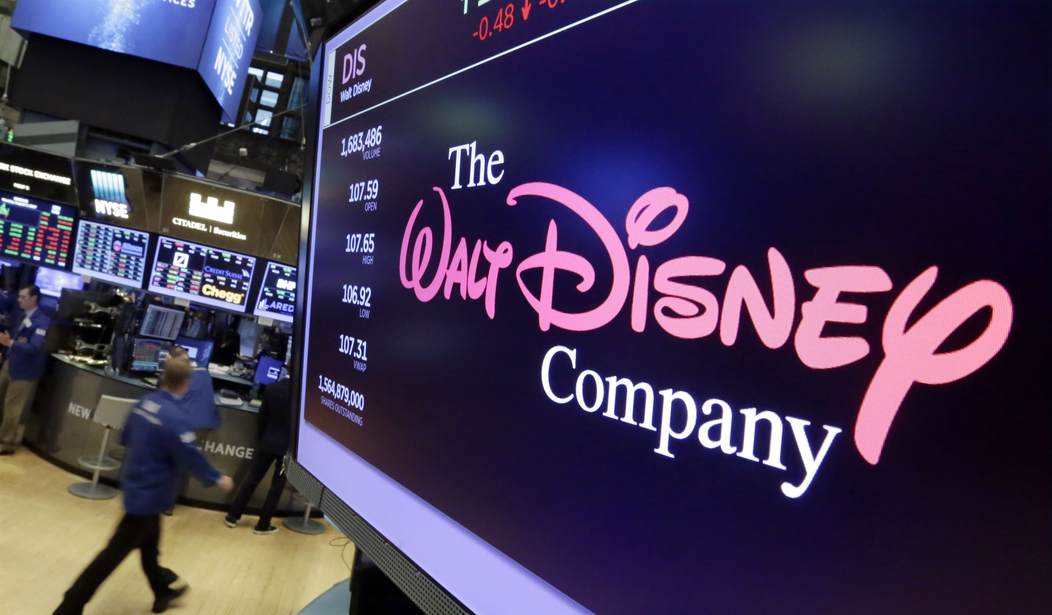In an unsurprising development for sane Americans, another major company is admitting that woke ESG — environmental, social and governance — policies are bad for its bottom line. As it turns out, going woke does in fact correlate with going broke, and this time, it's Disney making the uncomfortable realization that putting virtue signaling to intolerant leftists ahead of turning a profit was a mistake.
Disney's stock has had a rough go in recent years due to a series of missteps — which weren't necessarily accidental — that saw the legendary American brand run afoul of Americans' values and priorities. Over the last five years, Disney shares are down nearly 17 percent while indexes such as the Dow Jones moved up some 38 percent during the same timeframe.
Straight from Mickey's proverbial mouth, here's why Disney, in part at least, said it's struggling in a recent filing with the Securities and Exchange Commission (SEC). Explaining under the "risk assessment" header, Disney admitted that "Environmental, social and governance [ESG] matters and any related reporting obligations may impact our businesses."
More from Disney's SEC filing explains the issue (emphasis added):
...our revenues and profitability are adversely impacted when our entertainment offerings and products, as well as our methods to make our offerings and products available to consumers, do not achieve sufficient consumer acceptance. Further, consumers’ perceptions of our position on matters of public interest, including our efforts to achieve certain of our environmental and social goals, often differ widely and present risks to our reputation and brands. Consumer tastes and preferences impact, among other items, revenue from advertising sales (which are based in part on ratings for the programs in which advertisements air), affiliate fees, subscription fees, theatrical film receipts, the license of rights to other distributors, theme park admissions, hotel room charges and merchandise, food and beverage sales, sales of licensed consumer products or sales of our other consumer products and services.
Recommended
Ah yes, those pesky consumers and their perceptions of Disney's "position on matters of public interest" such as fighting Florida Governor Ron DeSantis on his parental right legislation and general wokeness in pursuit of "environmental and social goals." If only all Americans agreed with Disney's woke slat, they'd make money?
Clearly, as the release numbers for Disney's "Marvels" and "Wish" demonstrate, Disney is seeing how "adversely impacted" their profit and revenue are when the company's "entertainment offerings...do not achieve sufficient consumer acceptance."
For "Marvels," Disney brought in $47 million on opening weekend against the $270 million it paid to make what became the worst-performing Marvel franchise offering in history. "Wish" made $31.7 million over the five-day Thanksgiving "weekend" after Disney spent between $175 million and $200 million to produce it.
What won at the box office instead of Disney's recent releases? "The Hunger Games" $100 million prequel film "The Ballad of Songbirds and Snakes" broke franchise records:
The release of The Ballad of Songbirds and Snakes has not only been an individual success, but has also pushed the Hunger Games franchise to a total of more than $3 billion in total gross. Although it may not be the biggest franchise in the world, reaching that milestone over just five movies is quite an achievement.
"Ballad" had significant success despite what some of the wokescold gatekeepers in entertainment lamented would be a new protagonist instead of Katniss Everdeen, "a shining example of a young woman fighting for what she believes in against the odds and tearing down the power structures of her society," and instead focus on a story flipped "to focus on the architect of those power structures." According to the proven-wrong critics, such a movie "feels somewhat tone-deaf, especially in our current climate."
Well, outside of the ESG echo chambers, it turns out white male protagonists are still in demand with audiences who are willing to shell out inflated ticket costs to go watch them rather than woke virtue-signaling pablum from Disney.

























Join the conversation as a VIP Member